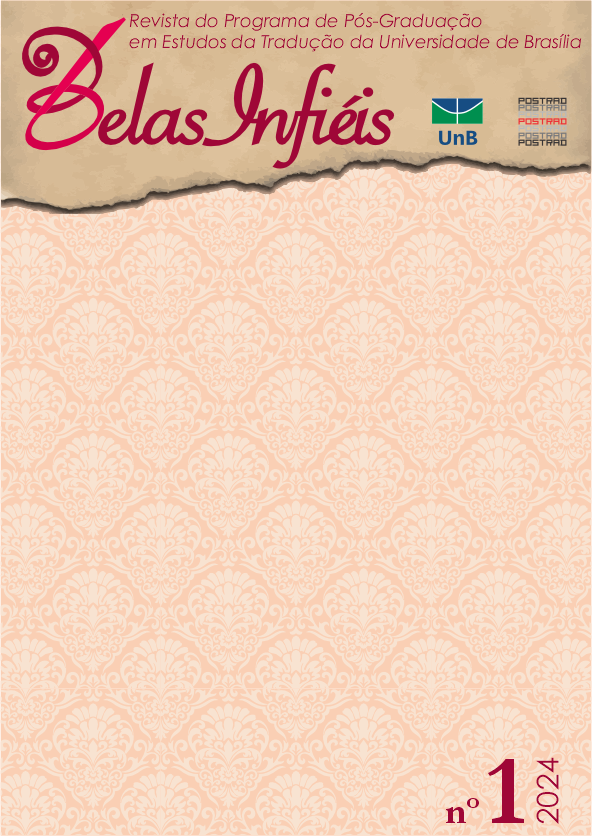“She was like a family member”: a translation of the short story Baleia (1937), by Graciliano Ramos, from Brazilian Portuguese into English
DOI :
https://doi.org/10.26512/belasinfieis.v13.n1.2024.54549Mots-clés :
Graciliano Ramos. Literature from Alagoas. Regional Literature. Vidas Secas. Literary translation.Résumé
Graciliano Ramos was a writer, journalist, politician and translator from Alagoas who lived between 1892 and 1953 - author of novels such as S. Bernardo (1934) and Angústia (1936) and his most recognized work Vidas Secas (1938). The novel Vidas Secas comes from the short story written by the author in 1937, entitled Baleia, which he wrote as a way of trying to imagine what goes on in the head of a dog as it dies. Graciliano Ramos' work is marked by an objective, almost silent style, in which the author expresses the dissatisfaction of the characters who are marginalized and hardened by reality. In contrast, Baleia, the dog who is aware of and participates in the narrative, observes the world from her perspective as an animal, finding human behaviour strange and revealing complex feelings in her composition presented by the omniscient narrator. The moment of the dog's death is presented in this translation from Brazilian Portuguese into English considering the story as a whole, and not as a part of the book.
Téléchargements
Références
Ramos, G. (2018). Baleia. In Vidas Secas (pp. 159-181). Record.
Ramos, G. (2013). Cartas. Record.
Cândido, A. (2012). Ficção e confissão. 4 ed. Ouro sobre Azul.
Bosi, A. (2017). História concisa da literatura brasileira. 52 ed. Cultrix.
Brayner, S. (2023). Graciliano Ramos. In Coutinho, A. A literatura no Brasil: era modernista (pp. 395-414). 8 ed. Global.
Bomfim, J. C. B. (2015). Baleia: persona literária; persona cinematográfica: do discurso literário ao audiovisual em Vidas secas. Baleia na Rede (Cessada), 1(11), 222-234.
http://revistas.marilia.unesp.br/index.php/baleianarede/article/view/4616
Chauvin, J. P. (2015). Graciliano ramos sob o fio da palavra empenhada. Teresa Revista de Literatura Brasileira, 16(1), 289-302.
http://www.revistas.usp.br/teresa/article/view/115431
Franco Aixelá, J. (1996). Culture-specific items in translation. In Álvarez, R.; África, M. C. Translation, Power, Subversion (pp. 52-78). Multilingual Matters LDT.
Téléchargements
Publié-e
Comment citer
Numéro
Rubrique
Licence
(c) Tous droits réservés CC BY 2024

Cette œuvre est sous licence Creative Commons Attribution 4.0 International.
Copyright Statement
Given the public access to this journal, the texts are free to use but requires the recognition of the original authorship and initial publication in this journal to be properly stated.
The journal allows the use of works published for non-commercial purposes, including the right to submit the work to publicly accessible databases. Published contributions are the sole and exclusive responsibility of the author(s).
- When submitting papers to be evaluated by the Belas Infiéis journal, the author(s):
- Declare that the contents of the contributions are original and of their original creation, being entirely responsible for their content if there is an objection by third parties.
- Claim to be aware that they should not commit academic plagiarism.
- Declare that the manuscript has not been published, completely or partially, in Portuguese or another language. If it is a translation it should be submitted to the Translated Articles section.
- Declare that the manuscript is not being evaluated by other journals.
- Declare that the manuscript was not submitted to another journal simultaneously.
- Commit(s) to inform the journal of any kind of error or inaccuracy in their contribution (published, in evaluation or in editing) and to collaborate with the editors to make due corrections of the article (when in evaluation or editing) or erratum/retraction (after publication).
- Declare that there is no conflict of interest regarding the published work.
- Authorize its release if it is accepted for publication without any kind of monetary compensation.
- Agree to assign non-exclusive rights to publication to the magazine, remaining free to make their contribution available in other media as long as the publication of the first version in Belas Infiéis magazine is mentioned. They also authorize Belas Infiéis to assign their texts for reproduction in content indexers, virtual libraries and similar platforms.
- Maintain copyright and grant the journal the right of first publication, the work being licensed under theCreative Commons Attribution License.
- Is/Are allowed and encouraged to publish and distribute their work online after the editorial process, which may increase the impact and citation of the published work.
- Authorize the editorial team to make textual adjustments and to adapt the article to the publication rules, when necessary.



















